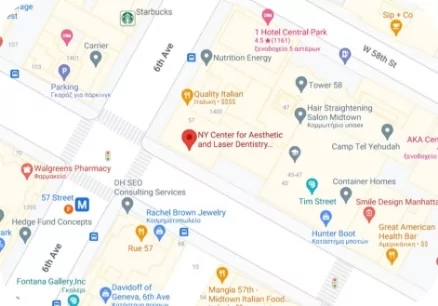
Here at NY Center for Aesthetic and Laser Dentistry, we understand that many people have genuine concerns about dental visits, making it tough to get the care they truly deserve. It’s okay to feel nervous about the sounds and sensations at a dental clinic. That’s why we’re excited to share about sedation dentistry.
It’s a gentle approach, designed with your comfort in mind. With it, we can help ensure your visits are relaxed and worry-free, while still prioritizing your smile and overall well-being. You’re in caring hands with us—your reliable sedation dentists near me!
Dental Sedation Is Meant To Help You
Understanding the need for a calm and stress-free dental experience, dental sedation is specifically tailored to help patients undergo various procedures with ease. Whether it’s routine care or more complex treatments, sedation dentists utilize this approach to alleviate anxiety, ensuring you remain comfortable and relaxed throughout your visit.
By minimizing discomfort and fear, dental sedation opens the door to better oral health without the apprehension that often accompanies dental visits. It’s our way of making sure your dental health journey is as pleasant and worry-free as possible.
Benefits of Sedation Dentistry in Our Manhattan Office
Sedation dentistry offers a host of benefits designed to make your dental experience as comfortable and stress-free as possible. For patients who experience anxiety or fear when it comes to dental procedures, dentist sedation can be a game-changer.
For those struggling with anxiety, consider these benefits. Sedation dentistry:
- Alleviates anxiety and fear.
- Allows multiple or lengthy procedures in one visit.
- Reduces the number of appointments needed.
- Assists with gag reflex control.
- Ensures smoother procedures for both the patient and the dentist.
- Helps patients stay still and relaxed, especially for those with disabilities.
Moreover, sedation can often lead to the patient having little to no memory of the procedure, which can be a relief for those with dental anxieties. If you struggle feeling comfortable at your dental checkups, call our team today to see if sedation dentistry could help you take control of your oral health.
Skipping The Dentist’s Office Can Create Severe Problems Down The Road
Avoiding dental appointments due to anxiety or fear can have serious consequences for your oral health.
- Get a Squeaky Clean Smile: Regular dental checkups are needed for removing the plaque in those hard-to-reach areas that get missed by home toothbrushes.
- Find and Treat Dental Problems Early: Checkups are also essential for early detection and treatment of issues such as cavities, gum disease, and other oral health problems. When these issues are left unaddressed, they can worsen over time, leading to more extensive and costly treatments in the future.
- Keep Your Health in Top Shape: In some cases, neglecting oral health can also have repercussions for your overall health. Weakened teeth can affect your eating, and untreated gum disease can lead to infections in your whole body. Regular dental checkups help prevent these problems.
Sedation dentistry is an excellent solution for those who tend to skip dental appointments due to anxiety, as it allows for a comfortable and stress-free experience.
What Types of Sedation Do You Offer?

At NY Center for Aesthetic and Laser Dentistry—led by a team of sedation dentists—we offer various types of sedation to cater to the diverse needs and preferences of our patients, including oral sedation dentistry and nitrous oxide. Each type of sedation is safe and effective, and our experienced dental team will work with you to determine the best option for your specific needs.
Nitrous Oxide (Laughing Gas)
What Is Nitrous Oxide?Nitrous oxide, commonly known as laughing gas, is a colorless, odorless gas used in dentistry to alleviate pain and anxiety during dental procedures. It is a mild sedation administered through a mask placed over the nose, allowing the patient to breathe in the gas.
What Does Nitrous Oxide Do?Nitrous oxide (laughing gas) helps in creating a sense of relaxation and well-being during dental procedures. It has mild anesthetic properties, which can reduce pain and discomfort.
What Does Laughing Gas Feel Like?Patients often describe the feeling of inhaling nitrous oxide as a sense of light-headedness or floating. It can also cause a tingling sensation in the arms and legs. The aim is to make the patient feel relaxed and comfortable during the dental procedure.
Can You Still Feel Pain With Nitrous Oxide?Nitrous oxide can reduce pain, but it’s usually used in conjunction with a local anesthetic to fully eliminate pain during procedures that might cause discomfort. The combination ensures that the patient is relaxed and free of pain throughout the procedure.
Does Laughing Gas Make You Laugh?The term “laughing gas” can be misleading. While nitrous oxide can make some patients feel euphoric or slightly giddy, it doesn’t usually cause full laughter. The name is more indicative of the light-hearted feeling it can produce.
Oral Conscious Sedation
What Is Oral Conscious Sedation?Oral conscious sedation involves taking a sedative pill before the dental procedure. It is a moderate form of sedation that doesn’t put you to sleep but makes you less aware of your surroundings and more relaxed. You’ll still be able to communicate with the dentist, but your memory of the procedure might be hazy.
Do I Need Oral Sedation Dentistry?Oral sedation dentistry is particularly beneficial for patients who have severe dental anxiety, a low pain threshold, sensitive teeth, or a bad gag reflex. It’s also helpful for those who need a large amount of dental work completed in a single sitting. Your dentist will discuss your health history and the specifics of the procedure to determine if oral sedation is a good option for you.
How Can I Find Sedation Dentistry Near Me in Manhattan, NY?
Finding a reliable and experienced sedation dentist in Manhattan is crucial for a positive dental experience. Dr. David J. Poiman at NY Center for Aesthetic and Laser Dentistry in Manhattan has years of experience helping his patients feel comfortable with sedation. Our whole team will do our best to help you have a positive experience with dental health.
For Dental Treatment That Feels Like a Dream, Contact Our Office Today!
Don’t let dental anxiety stand in the way of achieving the healthy and beautiful smile you deserve. With sedation dentistry, you can have a comfortable, pain-free experience even if you’ve been anxious about visiting the dentist.
Contact our office today to schedule your appointment with our team of sedation dentists near me, and learn more about how sedation dentistry can make your dental experience a dream.



